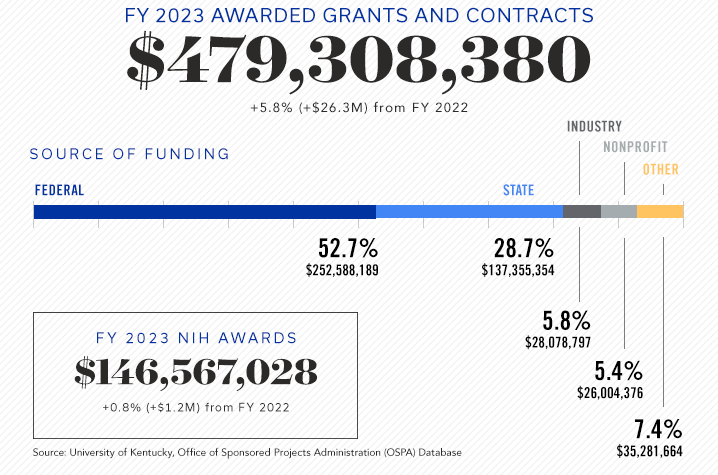Record-breaking awards fuel UK research in 2023

LEXINGTON, Ky. (Aug. 1, 2023) — For the first time in University of Kentucky history, investigators received $479.3 million in extramural grants and contracts to support their research in fiscal year (FY) 2023. This is a 5.8% increase from the $452.9 million in fiscal year (FY) 2022 research awards.
UK researchers also made history in FY23 with a record 1,877 research awards to a record 837 principal investigators from a record 621 sponsors.
“Our continued growth as a research university is directly connected to the intentional focus we have on the biggest issues – cancer, cardiovascular disease, diabetes, neuroscience, substance use, energy and equity – and now opportunities with new national investment to expand the economy through advanced manufacturing and materials science. Without a question, research is vital in our mission to serve Kentucky,” said UK President Eli Capilouto.
“Our people make our research possible. The principal investigators who lead our research teams work across academic boundaries to bring the best ideas to light. This growth is a testament to the creativity and innovation of the faculty, staff and students who make up our research investigator community at UK. Their tireless work continues to propel the university forward to advance our state and our nation,” said Vice President for Research Lisa Cassis.
Industry-sponsored research grew by 9.6% from $25.6 million in FY22 to $28.1 million in FY23.
UK clinical research was supported by $3.8 million from Eli Lilly and Company for the PRiMAL study, which examines the impact of review by a molecular tumor board — a team of medical experts who collaborate on treatment plans, looking at things like specific genetic tumor markers, to treat complex cancer cases. The five-year clinical trial, led by Jill Kolesar, Pharm.D., professor in the College of Pharmacy, will follow treatment and outcomes for 500 patients with advanced non-small cell lung cancer, the most common type of lung cancer. “Kentucky has the highest incidence of lung cancer in the nation,” said Mark Evers, M.D., Markey Cancer Center director, “but our work including Dr. Kolesar’s molecular tumor board — part of our individualized, precision medicine approach to patient care — is a model other cancer centers, across the country and internationally, are adopting to better care for cancer patients.”
The Center for Applied Energy Research (CAER) and the U.S. Department of Energy’s Oak Ridge National Laboratory are partners on a $10 million project ($1.9 million in FY23) to transform coal into high-value carbon fibers and composites. With construction, aerospace, automotive and defense applications, the market for carbon fibers is expected to grow at a compound annual growth rate of 12% through 2024. This is one of the leading-edge research fields related to UK’s newly created Materials Science Research Priority Area.
Non-profit awards increased by 16.7% ($22.3 million in FY22 to $26 million in FY23). A $3.3 million award from the Prichard Committee supports Shannon Sampson, Ph.D., assistant professor in the College of Education, who in partnership with the Kentucky Center for Statistics (KYSTATS), will serve in an external, independent evaluation capacity to support Full Service Community Schools. The goal is to improve the coordination, integration, accessibility and effectiveness of services for children and families in high-poverty schools across Kentucky.
Federal grants and contracts totaled $252.6 million, accounting for 52.7% of UK’s total awards in FY23, and supported critical drug overdose prevention and dementia treatment projects.
Terry Bunn, Ph.D., professor in the College of Public Health and director of the Kentucky Injury Prevention and Research Center (KIPRC), received $7.2 million from the Centers for Disease Control and Prevention (CDC) for Kentucky Overdose Data to Action, a program that works with local health departments, community stakeholders, and local and statewide agencies. The program leverages datasets (emergency department visits, inpatient hospitalizations, death certificates, prescription drug monitoring, and workers’ compensation claims) to identify specific targets for evidence-based prevention programs, to recruit and retain community stakeholders in the fight against drug overdose, and to help translate research into actionable interventions.
Christopher Norris, Ph.D., professor in the College of Medicine, leads a team of more than 30 scientists at the Sanders-Brown Center on Aging studying astrocytes. With $4.2 million in FY23 (part of a $20.5 million grant from the National Institute on Aging), his project “Strategies for Targeting Astrocyte Reactivity in Alzheimer’s Disease and Related Dementias (STAR-ADRD)” explores the role of these star-shaped cells in neurodegenerative disease progression and their potential to be therapeutic targets.
To learn more about the innovative research happening across campus that impacts our state and our nation, visit research.uky.edu/news.
As the state’s flagship, land-grant institution, the University of Kentucky exists to advance the Commonwealth. We do that by preparing the next generation of leaders — placing students at the heart of everything we do — and transforming the lives of Kentuckians through education, research and creative work, service and health care. We pride ourselves on being a catalyst for breakthroughs and a force for healing, a place where ingenuity unfolds. It's all made possible by our people — visionaries, disruptors and pioneers — who make up 200 academic programs, a $476.5 million research and development enterprise and a world-class medical center, all on one campus.




